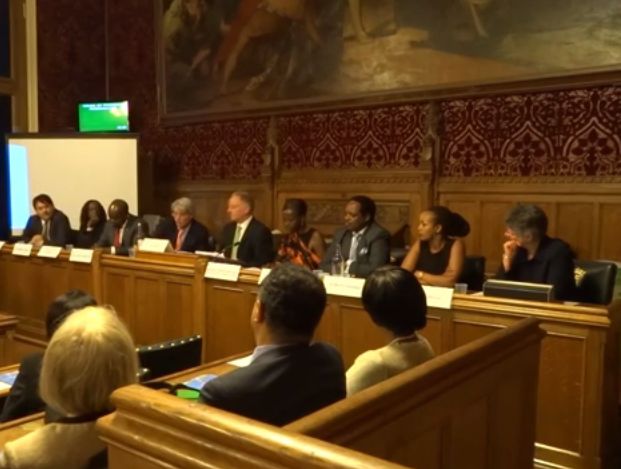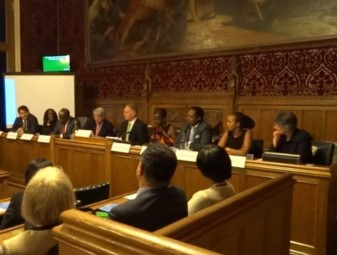
On Wednesday 26th March, SURF Vice-Chair, Alphonsine Kabagabo, spoke at the UK Kwibuka20 Global Conversations commemoration event at the Houses of Parliament.

Her full speech is available online here, though we paste below an extract:
I speak to you first and foremost as a survivor of the genocide, and as a Rwandan, now living in the UK, who is engaged in Rwanda’s determined effort to “Remember, Unite and Renew” now and into the future. I must say it is difficult for me to speak. It is difficult for me and other survivors at this time. Memories and pain are flooding back, and many survivors I know are experiencing great trauma on this 20th anniversary. But it is important, and I welcome this opportunity.
I speak to you also as a committed supporter of the most vulnerable survivors of the genocide against the Tutsi in Rwanda and in my capacity as Vice Chair of Survivors Fund (SURF). This evening we remember the dead. This evening we remember survivors too. We are an integral part of Rwanda and its reconstruction – our well-being contributes to the well-being of our nation, our healing helps to heal Rwanda.
…
For survivors Twenty Years on, there is quite simply not enough funding to address their ongoing critical needs at scale.
It is for that reason that our work ahead focuses on reparation for survivors. In December 2013 SURF and seven survivor-led organisations in Rwanda formed a collective – the “Taskforce to Remember Survivors20”, to work with Kwibuka20 and to advocate for the ongoing needs of survivors.
Its key call is to address the issue of reparation for survivors and for the establishment of an International Trust Fund to support survivors.
In matters of justice, the UN did not prevent the genocide, nor did it stop the killing once the genocide had begun. The UN Security Council has accepted responsibility, and so have a number of others. This has not translated so far into anything more meaningful.
2014 also marks the closure of the International Criminal Tribunal for Rwanda (ICTR), on which the United Nations has spent over $1 billion since it was established in 1994. However, it has no mandate to award reparation to victims of cases that it hears, a shortcoming which its own former President has stated will be “forever a stain on its reputation.”
But there is now a unique opportunity to address the issue of reparation. The President of the ICTR, recently commissioned the International Organisation for Migration (IOM) to undertake an assessment study on the unresolved issue of reparation for victims of the genocide in Rwanda. The Rwandan Minister of Justice has accepted a proposal by the IOM to partner on this study. In principle the report will be published later this year to provide technical input on concrete ways forward for reparation to be addressed.
Over the ten years of gacaca, Rwanda’s system of community justice addressing lower category genocide crimes, restitution of property looted and pillaged during the 1994 genocide was the only tangible form of reparation available to survivors.
Tens of thousands of restitution awards were made. However, most awards have never been enforced, and will unlikely ever be so. Many survivors state that justice has not truly been served, as it has not included reparation.
As we reflect on efforts made to end impunity in Rwanda since 1994, all actors – in particular the international community – should consider how justice can finally deliver the dignity and independence for which survivors still hold out hope. Offering more than just apologies, and setting up a viable reparation programme and an International Trust Fund would go a long way to demonstrate commitment to ensuring justice for survivors of the genocide against the Tutsi.
Reparation will not solve all the problems of survivors, but it will contribute to their self-reliance. If reconciliation is truly possible, it will be built on this foundation of justice. It is towards this end and to the establishment of an International Trust Fund that SURF and survivor-led organisations will be focused in this 20th Anniversary year.
Thank you.
